University Lean Management Report: Food Manufacturing Processes
VerifiedAdded on 2022/10/19
|14
|1843
|14
Report
AI Summary
This report delves into the application of lean management principles within the context of a food manufacturing company. It begins by outlining the role and responsibilities of a manufacturing manager, emphasizing the use of lean concepts to optimize production processes. The report examines the application of the PDCA cycle for continuous improvement and waste reduction in the food industry. It then extends the application of lean concepts to non-job-related tasks, such as household grocery management, highlighting the versatility of these techniques. A key focus is the introduction of a two-bin kanban system to improve inventory management and reduce waste. The report concludes by emphasizing the importance of lean management in enhancing operational efficiency, reducing costs, and promoting sustainability within the food manufacturing sector. The document provides a detailed analysis of lean management tools and their practical implementation, offering valuable insights for managers and professionals in the field.
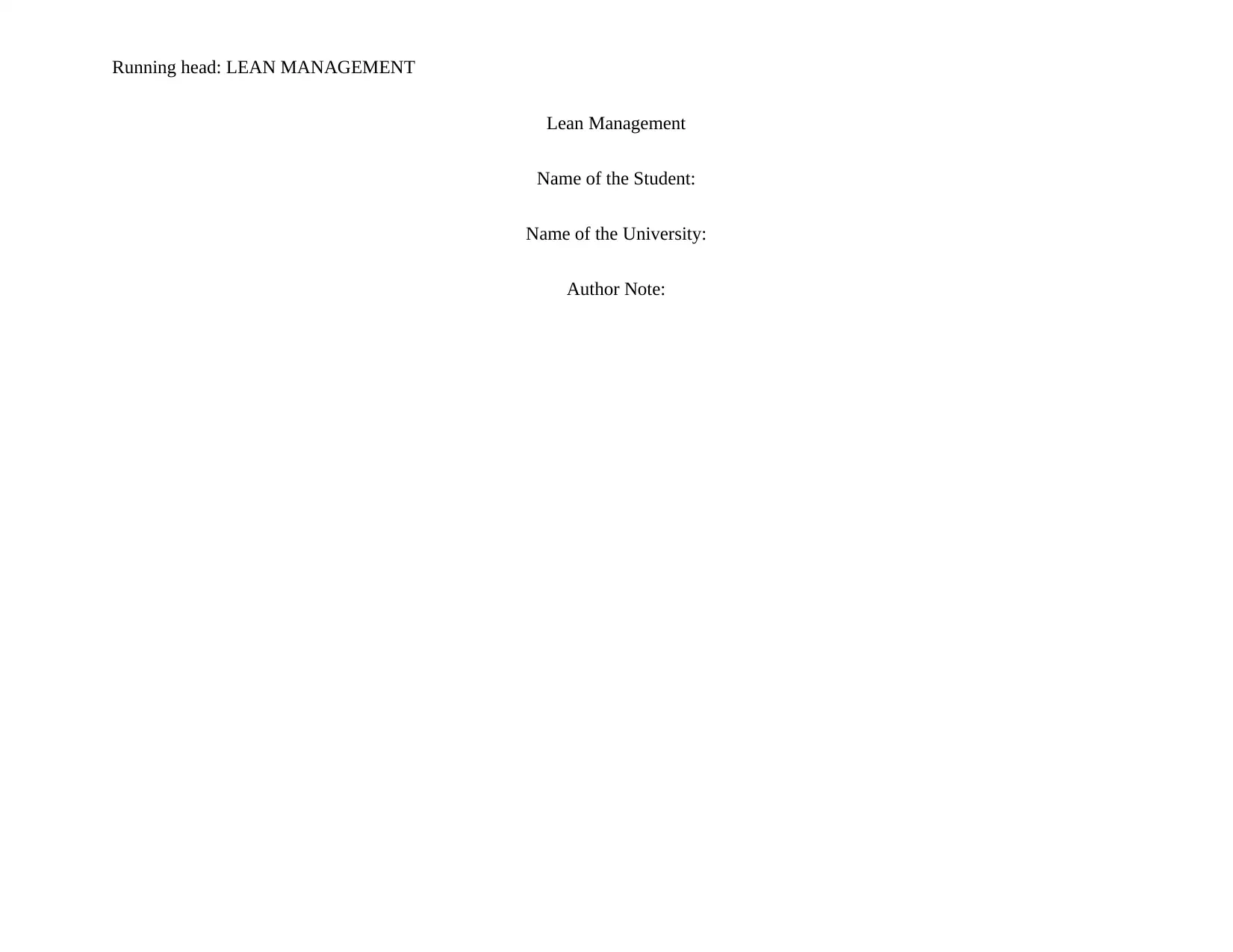
Running head: LEAN MANAGEMENT
Lean Management
Name of the Student:
Name of the University:
Author Note:
Lean Management
Name of the Student:
Name of the University:
Author Note:
Paraphrase This Document
Need a fresh take? Get an instant paraphrase of this document with our AI Paraphraser
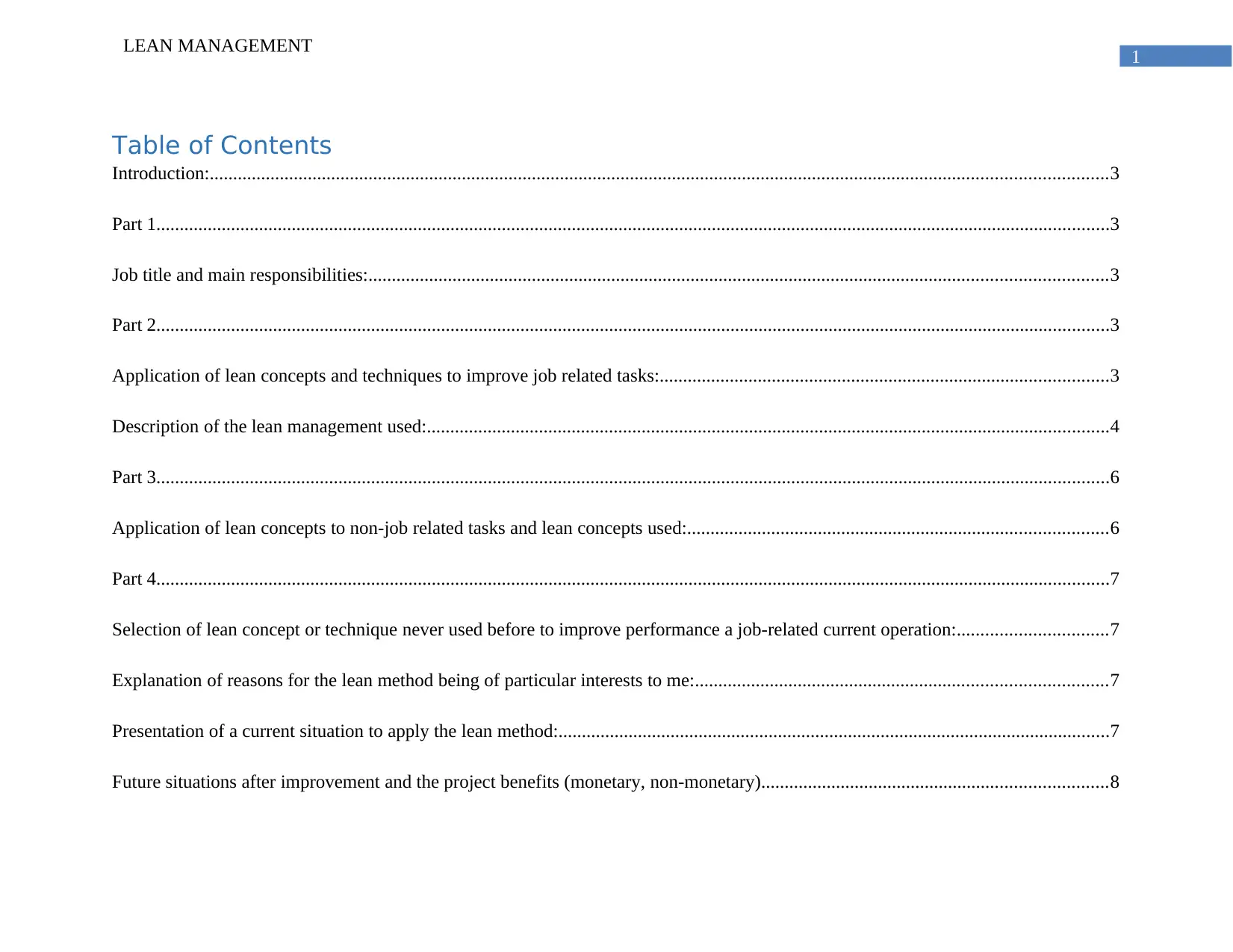
1
LEAN MANAGEMENT
Table of Contents
Introduction:................................................................................................................................................................................................3
Part 1............................................................................................................................................................................................................3
Job title and main responsibilities:..............................................................................................................................................................3
Part 2............................................................................................................................................................................................................3
Application of lean concepts and techniques to improve job related tasks:................................................................................................3
Description of the lean management used:..................................................................................................................................................4
Part 3............................................................................................................................................................................................................6
Application of lean concepts to non-job related tasks and lean concepts used:..........................................................................................6
Part 4............................................................................................................................................................................................................7
Selection of lean concept or technique never used before to improve performance a job-related current operation:................................7
Explanation of reasons for the lean method being of particular interests to me:........................................................................................7
Presentation of a current situation to apply the lean method:......................................................................................................................7
Future situations after improvement and the project benefits (monetary, non-monetary)..........................................................................8
LEAN MANAGEMENT
Table of Contents
Introduction:................................................................................................................................................................................................3
Part 1............................................................................................................................................................................................................3
Job title and main responsibilities:..............................................................................................................................................................3
Part 2............................................................................................................................................................................................................3
Application of lean concepts and techniques to improve job related tasks:................................................................................................3
Description of the lean management used:..................................................................................................................................................4
Part 3............................................................................................................................................................................................................6
Application of lean concepts to non-job related tasks and lean concepts used:..........................................................................................6
Part 4............................................................................................................................................................................................................7
Selection of lean concept or technique never used before to improve performance a job-related current operation:................................7
Explanation of reasons for the lean method being of particular interests to me:........................................................................................7
Presentation of a current situation to apply the lean method:......................................................................................................................7
Future situations after improvement and the project benefits (monetary, non-monetary)..........................................................................8
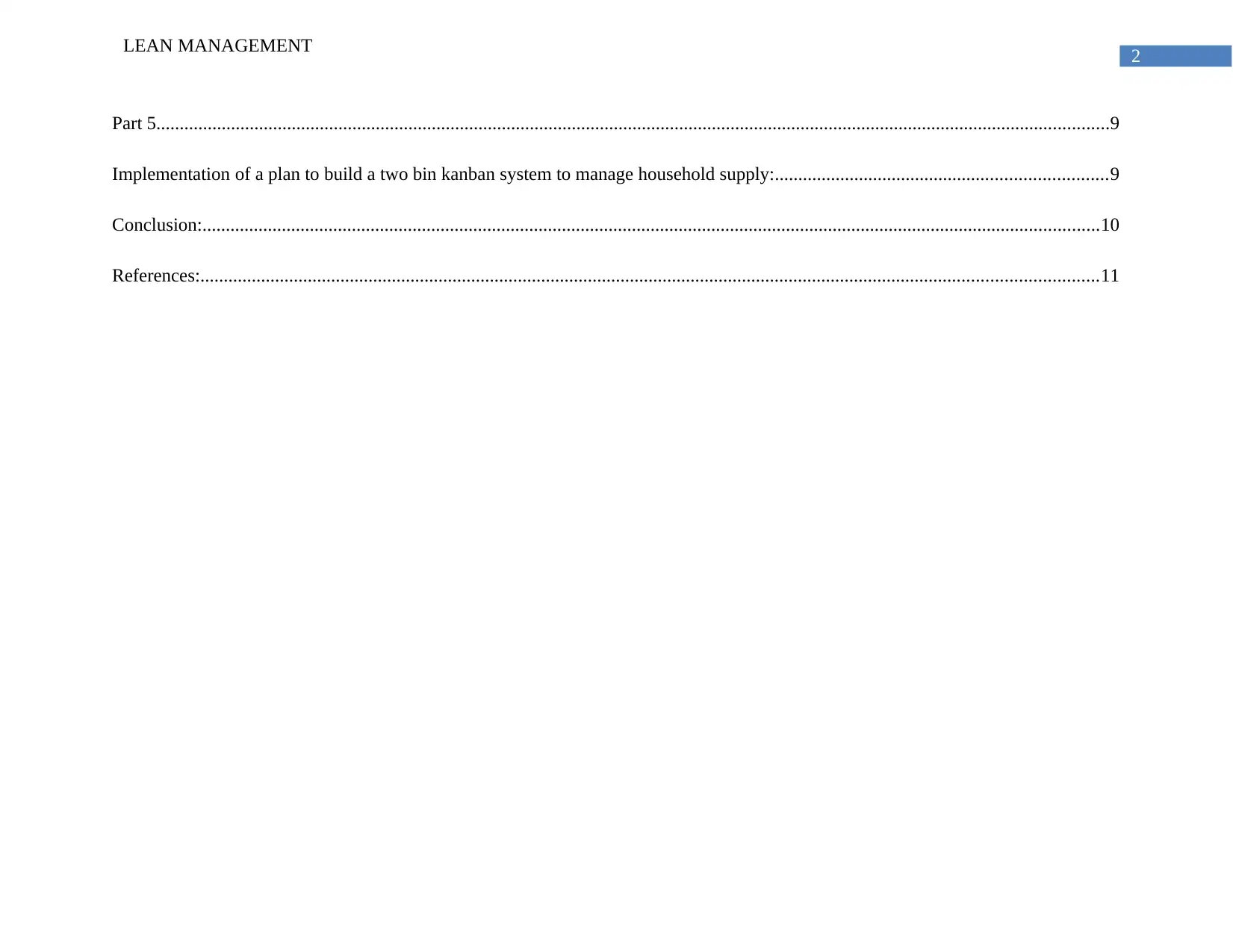
2
LEAN MANAGEMENT
Part 5............................................................................................................................................................................................................9
Implementation of a plan to build a two bin kanban system to manage household supply:.......................................................................9
Conclusion:................................................................................................................................................................................................10
References:................................................................................................................................................................................................11
LEAN MANAGEMENT
Part 5............................................................................................................................................................................................................9
Implementation of a plan to build a two bin kanban system to manage household supply:.......................................................................9
Conclusion:................................................................................................................................................................................................10
References:................................................................................................................................................................................................11
⊘ This is a preview!⊘
Do you want full access?
Subscribe today to unlock all pages.

Trusted by 1+ million students worldwide
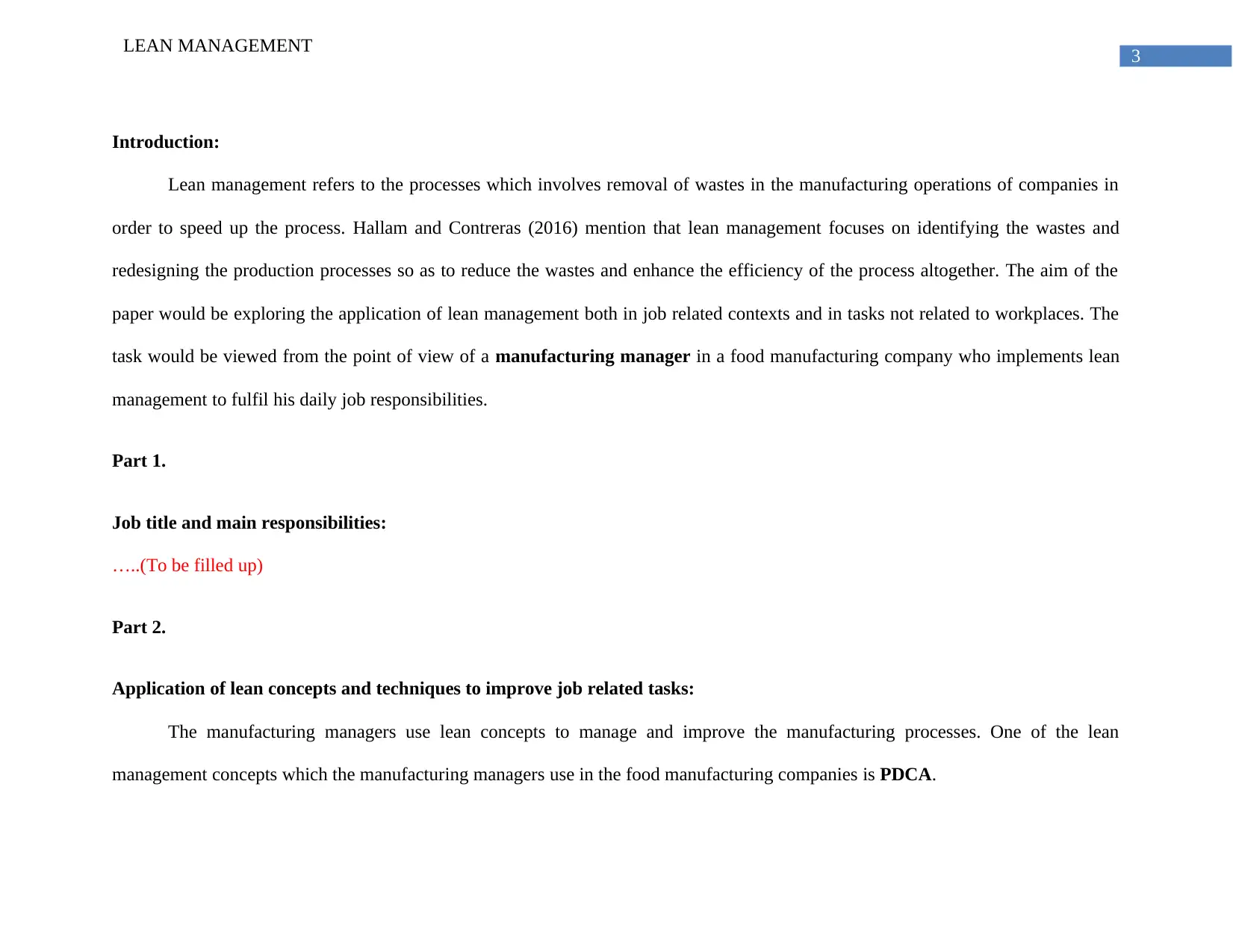
3
LEAN MANAGEMENT
Introduction:
Lean management refers to the processes which involves removal of wastes in the manufacturing operations of companies in
order to speed up the process. Hallam and Contreras (2016) mention that lean management focuses on identifying the wastes and
redesigning the production processes so as to reduce the wastes and enhance the efficiency of the process altogether. The aim of the
paper would be exploring the application of lean management both in job related contexts and in tasks not related to workplaces. The
task would be viewed from the point of view of a manufacturing manager in a food manufacturing company who implements lean
management to fulfil his daily job responsibilities.
Part 1.
Job title and main responsibilities:
…..(To be filled up)
Part 2.
Application of lean concepts and techniques to improve job related tasks:
The manufacturing managers use lean concepts to manage and improve the manufacturing processes. One of the lean
management concepts which the manufacturing managers use in the food manufacturing companies is PDCA.
LEAN MANAGEMENT
Introduction:
Lean management refers to the processes which involves removal of wastes in the manufacturing operations of companies in
order to speed up the process. Hallam and Contreras (2016) mention that lean management focuses on identifying the wastes and
redesigning the production processes so as to reduce the wastes and enhance the efficiency of the process altogether. The aim of the
paper would be exploring the application of lean management both in job related contexts and in tasks not related to workplaces. The
task would be viewed from the point of view of a manufacturing manager in a food manufacturing company who implements lean
management to fulfil his daily job responsibilities.
Part 1.
Job title and main responsibilities:
…..(To be filled up)
Part 2.
Application of lean concepts and techniques to improve job related tasks:
The manufacturing managers use lean concepts to manage and improve the manufacturing processes. One of the lean
management concepts which the manufacturing managers use in the food manufacturing companies is PDCA.
Paraphrase This Document
Need a fresh take? Get an instant paraphrase of this document with our AI Paraphraser
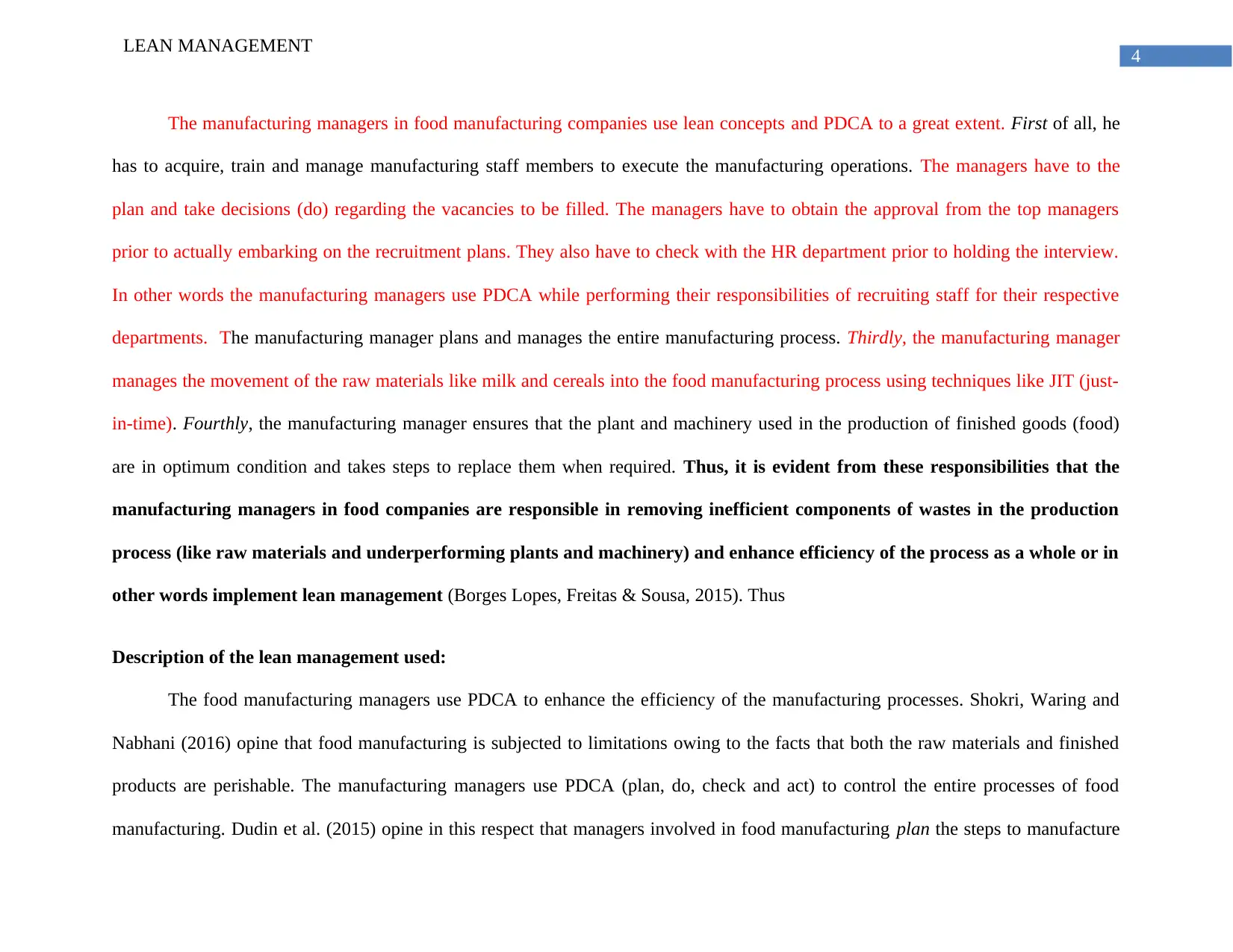
4
LEAN MANAGEMENT
The manufacturing managers in food manufacturing companies use lean concepts and PDCA to a great extent. First of all, he
has to acquire, train and manage manufacturing staff members to execute the manufacturing operations. The managers have to the
plan and take decisions (do) regarding the vacancies to be filled. The managers have to obtain the approval from the top managers
prior to actually embarking on the recruitment plans. They also have to check with the HR department prior to holding the interview.
In other words the manufacturing managers use PDCA while performing their responsibilities of recruiting staff for their respective
departments. The manufacturing manager plans and manages the entire manufacturing process. Thirdly, the manufacturing manager
manages the movement of the raw materials like milk and cereals into the food manufacturing process using techniques like JIT (just-
in-time). Fourthly, the manufacturing manager ensures that the plant and machinery used in the production of finished goods (food)
are in optimum condition and takes steps to replace them when required. Thus, it is evident from these responsibilities that the
manufacturing managers in food companies are responsible in removing inefficient components of wastes in the production
process (like raw materials and underperforming plants and machinery) and enhance efficiency of the process as a whole or in
other words implement lean management (Borges Lopes, Freitas & Sousa, 2015). Thus
Description of the lean management used:
The food manufacturing managers use PDCA to enhance the efficiency of the manufacturing processes. Shokri, Waring and
Nabhani (2016) opine that food manufacturing is subjected to limitations owing to the facts that both the raw materials and finished
products are perishable. The manufacturing managers use PDCA (plan, do, check and act) to control the entire processes of food
manufacturing. Dudin et al. (2015) opine in this respect that managers involved in food manufacturing plan the steps to manufacture
LEAN MANAGEMENT
The manufacturing managers in food manufacturing companies use lean concepts and PDCA to a great extent. First of all, he
has to acquire, train and manage manufacturing staff members to execute the manufacturing operations. The managers have to the
plan and take decisions (do) regarding the vacancies to be filled. The managers have to obtain the approval from the top managers
prior to actually embarking on the recruitment plans. They also have to check with the HR department prior to holding the interview.
In other words the manufacturing managers use PDCA while performing their responsibilities of recruiting staff for their respective
departments. The manufacturing manager plans and manages the entire manufacturing process. Thirdly, the manufacturing manager
manages the movement of the raw materials like milk and cereals into the food manufacturing process using techniques like JIT (just-
in-time). Fourthly, the manufacturing manager ensures that the plant and machinery used in the production of finished goods (food)
are in optimum condition and takes steps to replace them when required. Thus, it is evident from these responsibilities that the
manufacturing managers in food companies are responsible in removing inefficient components of wastes in the production
process (like raw materials and underperforming plants and machinery) and enhance efficiency of the process as a whole or in
other words implement lean management (Borges Lopes, Freitas & Sousa, 2015). Thus
Description of the lean management used:
The food manufacturing managers use PDCA to enhance the efficiency of the manufacturing processes. Shokri, Waring and
Nabhani (2016) opine that food manufacturing is subjected to limitations owing to the facts that both the raw materials and finished
products are perishable. The manufacturing managers use PDCA (plan, do, check and act) to control the entire processes of food
manufacturing. Dudin et al. (2015) opine in this respect that managers involved in food manufacturing plan the steps to manufacture
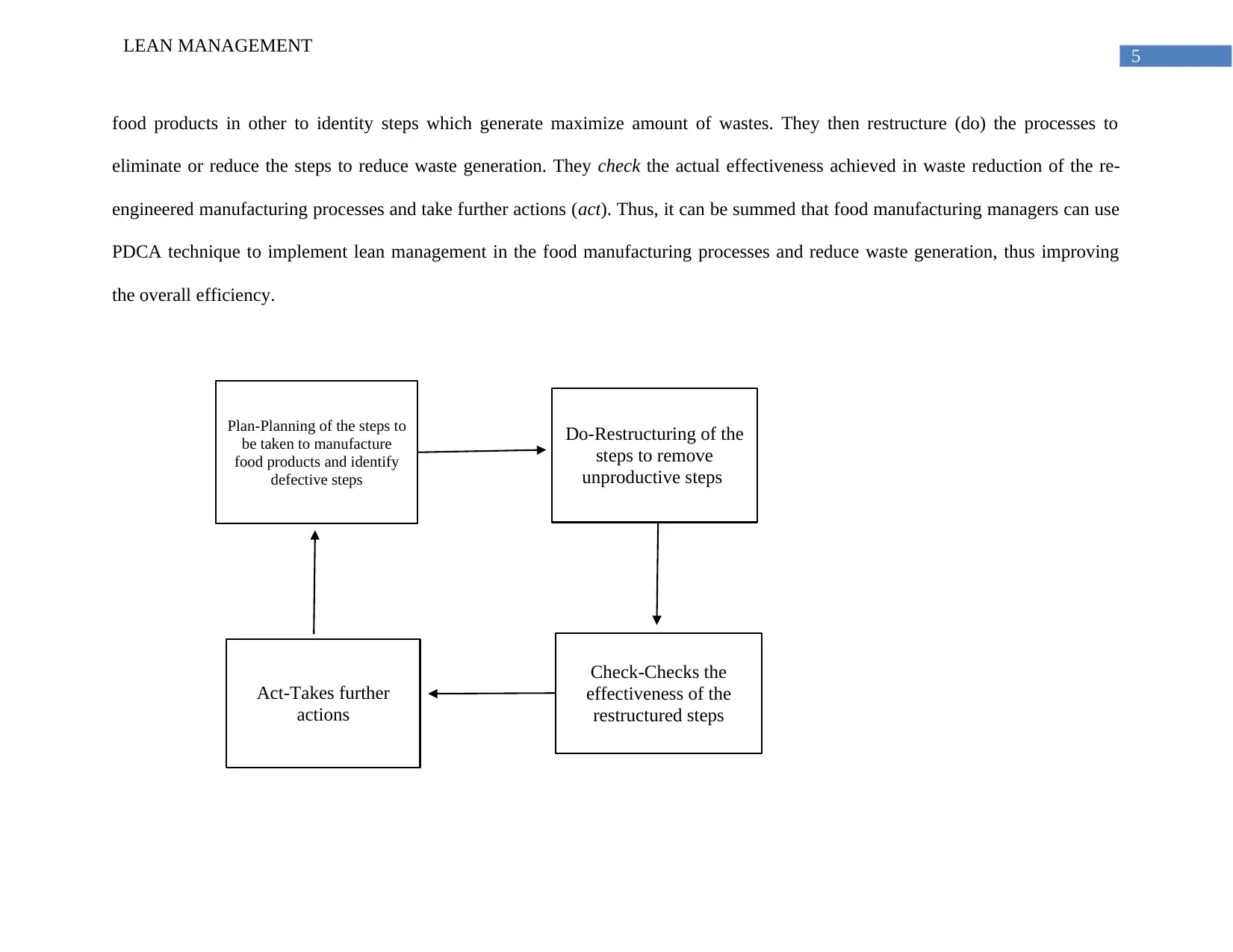
5
LEAN MANAGEMENT
Plan-Planning of the steps to
be taken to manufacture
food products and identify
defective steps
Do-Restructuring of the
steps to remove
unproductive steps
Check-Checks the
effectiveness of the
restructured steps
Act-Takes further
actions
food products in other to identity steps which generate maximize amount of wastes. They then restructure (do) the processes to
eliminate or reduce the steps to reduce waste generation. They check the actual effectiveness achieved in waste reduction of the re-
engineered manufacturing processes and take further actions (act). Thus, it can be summed that food manufacturing managers can use
PDCA technique to implement lean management in the food manufacturing processes and reduce waste generation, thus improving
the overall efficiency.
LEAN MANAGEMENT
Plan-Planning of the steps to
be taken to manufacture
food products and identify
defective steps
Do-Restructuring of the
steps to remove
unproductive steps
Check-Checks the
effectiveness of the
restructured steps
Act-Takes further
actions
food products in other to identity steps which generate maximize amount of wastes. They then restructure (do) the processes to
eliminate or reduce the steps to reduce waste generation. They check the actual effectiveness achieved in waste reduction of the re-
engineered manufacturing processes and take further actions (act). Thus, it can be summed that food manufacturing managers can use
PDCA technique to implement lean management in the food manufacturing processes and reduce waste generation, thus improving
the overall efficiency.
⊘ This is a preview!⊘
Do you want full access?
Subscribe today to unlock all pages.

Trusted by 1+ million students worldwide
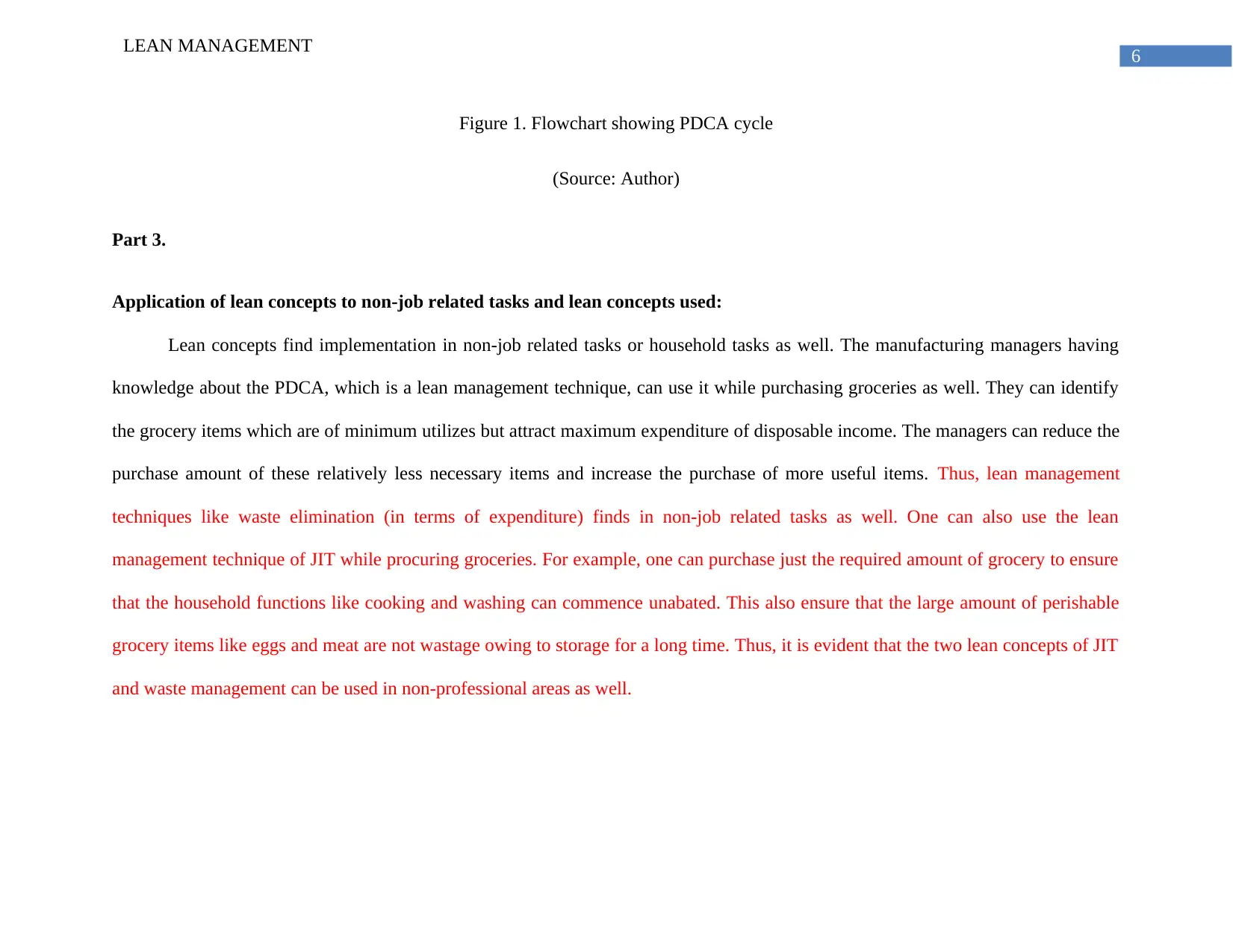
6
LEAN MANAGEMENT
Figure 1. Flowchart showing PDCA cycle
(Source: Author)
Part 3.
Application of lean concepts to non-job related tasks and lean concepts used:
Lean concepts find implementation in non-job related tasks or household tasks as well. The manufacturing managers having
knowledge about the PDCA, which is a lean management technique, can use it while purchasing groceries as well. They can identify
the grocery items which are of minimum utilizes but attract maximum expenditure of disposable income. The managers can reduce the
purchase amount of these relatively less necessary items and increase the purchase of more useful items. Thus, lean management
techniques like waste elimination (in terms of expenditure) finds in non-job related tasks as well. One can also use the lean
management technique of JIT while procuring groceries. For example, one can purchase just the required amount of grocery to ensure
that the household functions like cooking and washing can commence unabated. This also ensure that the large amount of perishable
grocery items like eggs and meat are not wastage owing to storage for a long time. Thus, it is evident that the two lean concepts of JIT
and waste management can be used in non-professional areas as well.
LEAN MANAGEMENT
Figure 1. Flowchart showing PDCA cycle
(Source: Author)
Part 3.
Application of lean concepts to non-job related tasks and lean concepts used:
Lean concepts find implementation in non-job related tasks or household tasks as well. The manufacturing managers having
knowledge about the PDCA, which is a lean management technique, can use it while purchasing groceries as well. They can identify
the grocery items which are of minimum utilizes but attract maximum expenditure of disposable income. The managers can reduce the
purchase amount of these relatively less necessary items and increase the purchase of more useful items. Thus, lean management
techniques like waste elimination (in terms of expenditure) finds in non-job related tasks as well. One can also use the lean
management technique of JIT while procuring groceries. For example, one can purchase just the required amount of grocery to ensure
that the household functions like cooking and washing can commence unabated. This also ensure that the large amount of perishable
grocery items like eggs and meat are not wastage owing to storage for a long time. Thus, it is evident that the two lean concepts of JIT
and waste management can be used in non-professional areas as well.
Paraphrase This Document
Need a fresh take? Get an instant paraphrase of this document with our AI Paraphraser
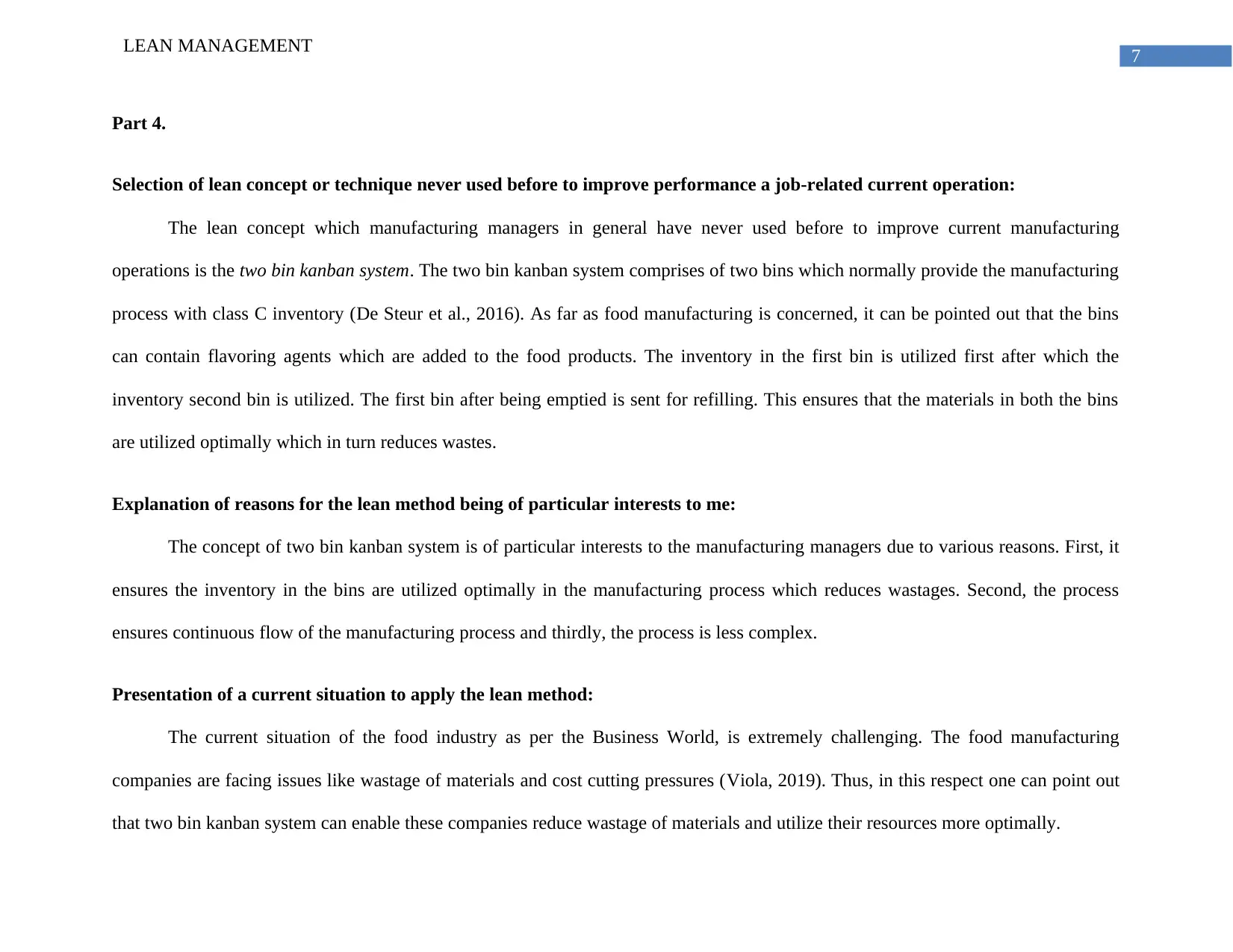
7
LEAN MANAGEMENT
Part 4.
Selection of lean concept or technique never used before to improve performance a job-related current operation:
The lean concept which manufacturing managers in general have never used before to improve current manufacturing
operations is the two bin kanban system. The two bin kanban system comprises of two bins which normally provide the manufacturing
process with class C inventory (De Steur et al., 2016). As far as food manufacturing is concerned, it can be pointed out that the bins
can contain flavoring agents which are added to the food products. The inventory in the first bin is utilized first after which the
inventory second bin is utilized. The first bin after being emptied is sent for refilling. This ensures that the materials in both the bins
are utilized optimally which in turn reduces wastes.
Explanation of reasons for the lean method being of particular interests to me:
The concept of two bin kanban system is of particular interests to the manufacturing managers due to various reasons. First, it
ensures the inventory in the bins are utilized optimally in the manufacturing process which reduces wastages. Second, the process
ensures continuous flow of the manufacturing process and thirdly, the process is less complex.
Presentation of a current situation to apply the lean method:
The current situation of the food industry as per the Business World, is extremely challenging. The food manufacturing
companies are facing issues like wastage of materials and cost cutting pressures (Viola, 2019). Thus, in this respect one can point out
that two bin kanban system can enable these companies reduce wastage of materials and utilize their resources more optimally.
LEAN MANAGEMENT
Part 4.
Selection of lean concept or technique never used before to improve performance a job-related current operation:
The lean concept which manufacturing managers in general have never used before to improve current manufacturing
operations is the two bin kanban system. The two bin kanban system comprises of two bins which normally provide the manufacturing
process with class C inventory (De Steur et al., 2016). As far as food manufacturing is concerned, it can be pointed out that the bins
can contain flavoring agents which are added to the food products. The inventory in the first bin is utilized first after which the
inventory second bin is utilized. The first bin after being emptied is sent for refilling. This ensures that the materials in both the bins
are utilized optimally which in turn reduces wastes.
Explanation of reasons for the lean method being of particular interests to me:
The concept of two bin kanban system is of particular interests to the manufacturing managers due to various reasons. First, it
ensures the inventory in the bins are utilized optimally in the manufacturing process which reduces wastages. Second, the process
ensures continuous flow of the manufacturing process and thirdly, the process is less complex.
Presentation of a current situation to apply the lean method:
The current situation of the food industry as per the Business World, is extremely challenging. The food manufacturing
companies are facing issues like wastage of materials and cost cutting pressures (Viola, 2019). Thus, in this respect one can point out
that two bin kanban system can enable these companies reduce wastage of materials and utilize their resources more optimally.
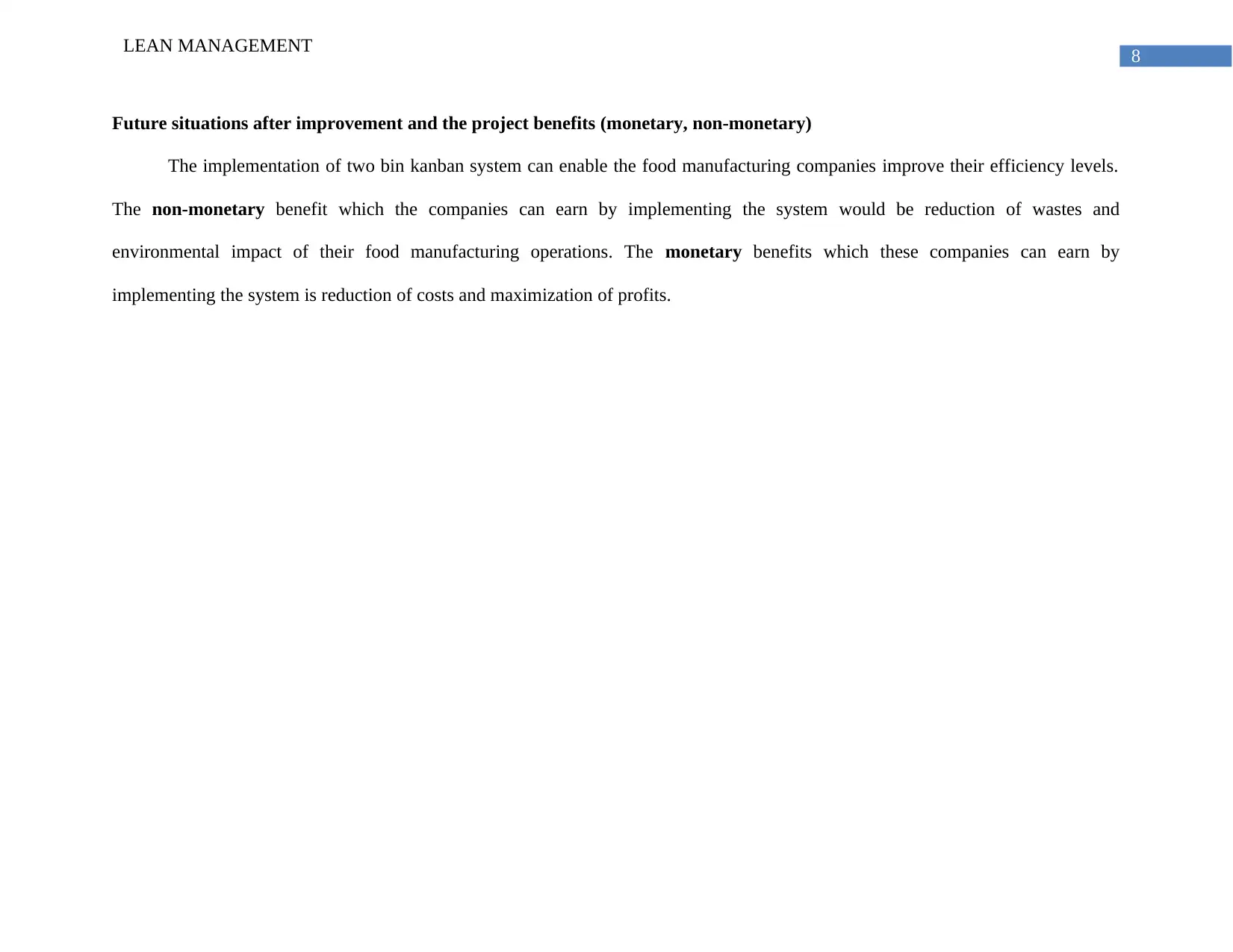
8
LEAN MANAGEMENT
Future situations after improvement and the project benefits (monetary, non-monetary)
The implementation of two bin kanban system can enable the food manufacturing companies improve their efficiency levels.
The non-monetary benefit which the companies can earn by implementing the system would be reduction of wastes and
environmental impact of their food manufacturing operations. The monetary benefits which these companies can earn by
implementing the system is reduction of costs and maximization of profits.
LEAN MANAGEMENT
Future situations after improvement and the project benefits (monetary, non-monetary)
The implementation of two bin kanban system can enable the food manufacturing companies improve their efficiency levels.
The non-monetary benefit which the companies can earn by implementing the system would be reduction of wastes and
environmental impact of their food manufacturing operations. The monetary benefits which these companies can earn by
implementing the system is reduction of costs and maximization of profits.
⊘ This is a preview!⊘
Do you want full access?
Subscribe today to unlock all pages.

Trusted by 1+ million students worldwide
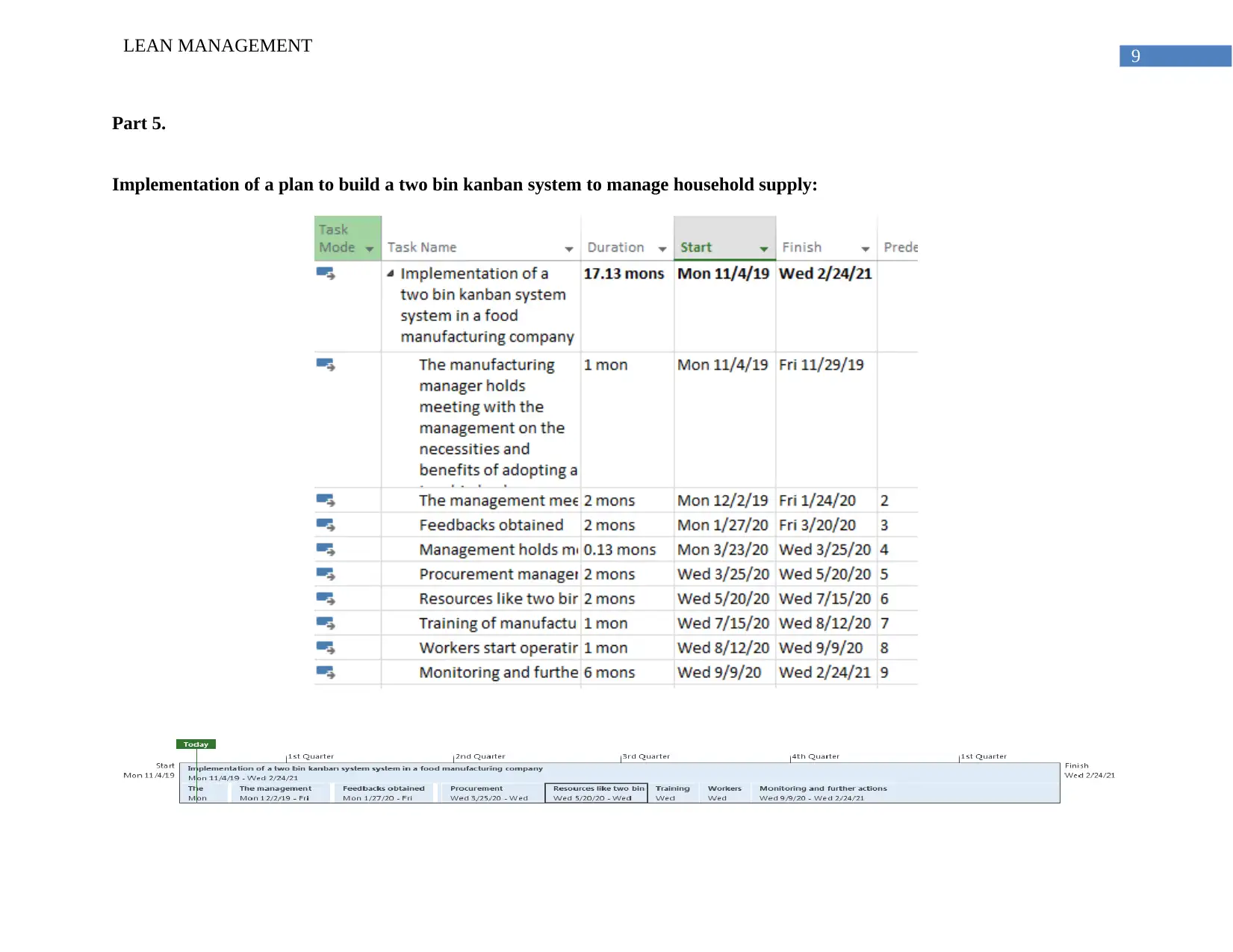
9
LEAN MANAGEMENT
Part 5.
Implementation of a plan to build a two bin kanban system to manage household supply:
LEAN MANAGEMENT
Part 5.
Implementation of a plan to build a two bin kanban system to manage household supply:
Paraphrase This Document
Need a fresh take? Get an instant paraphrase of this document with our AI Paraphraser
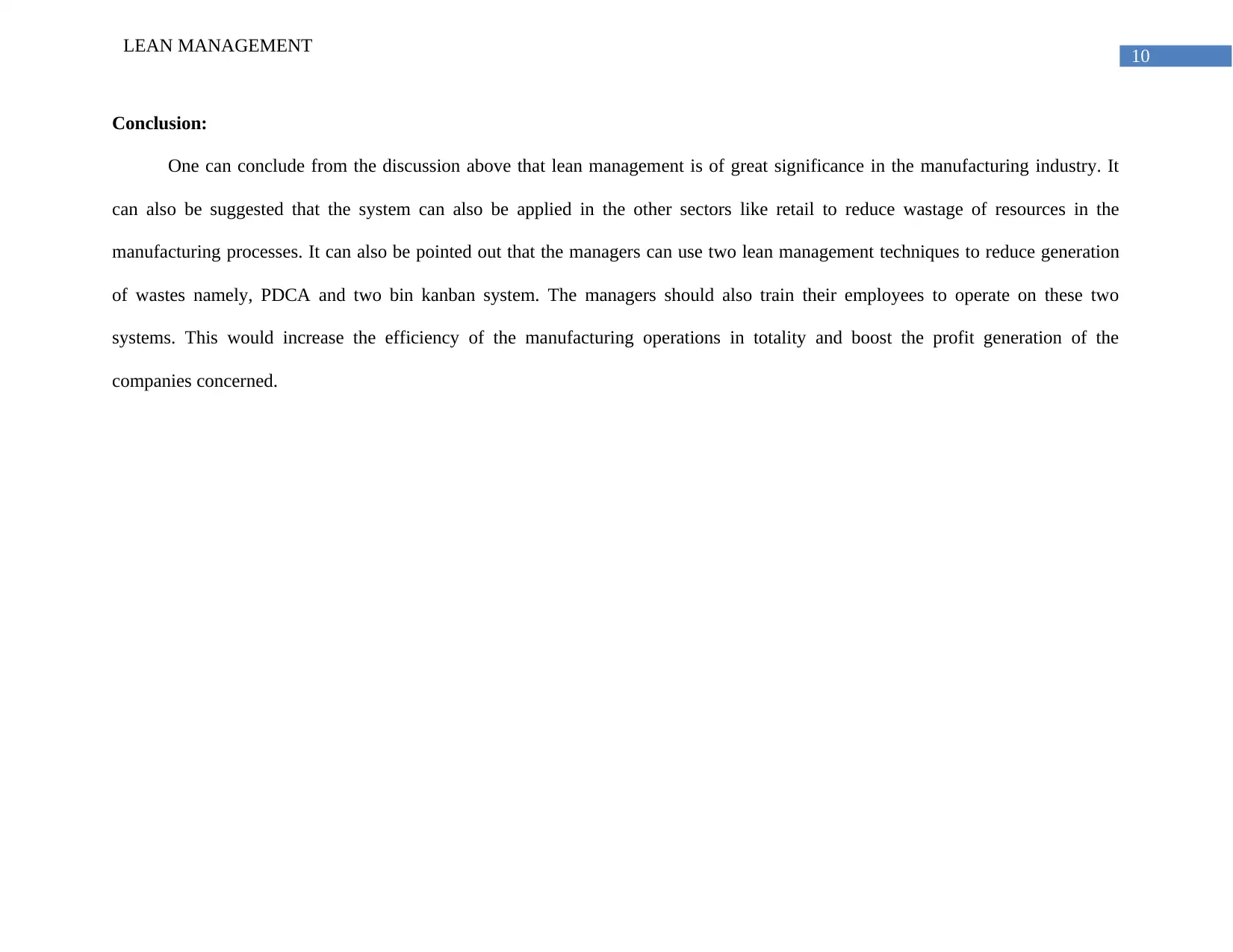
10
LEAN MANAGEMENT
Conclusion:
One can conclude from the discussion above that lean management is of great significance in the manufacturing industry. It
can also be suggested that the system can also be applied in the other sectors like retail to reduce wastage of resources in the
manufacturing processes. It can also be pointed out that the managers can use two lean management techniques to reduce generation
of wastes namely, PDCA and two bin kanban system. The managers should also train their employees to operate on these two
systems. This would increase the efficiency of the manufacturing operations in totality and boost the profit generation of the
companies concerned.
LEAN MANAGEMENT
Conclusion:
One can conclude from the discussion above that lean management is of great significance in the manufacturing industry. It
can also be suggested that the system can also be applied in the other sectors like retail to reduce wastage of resources in the
manufacturing processes. It can also be pointed out that the managers can use two lean management techniques to reduce generation
of wastes namely, PDCA and two bin kanban system. The managers should also train their employees to operate on these two
systems. This would increase the efficiency of the manufacturing operations in totality and boost the profit generation of the
companies concerned.
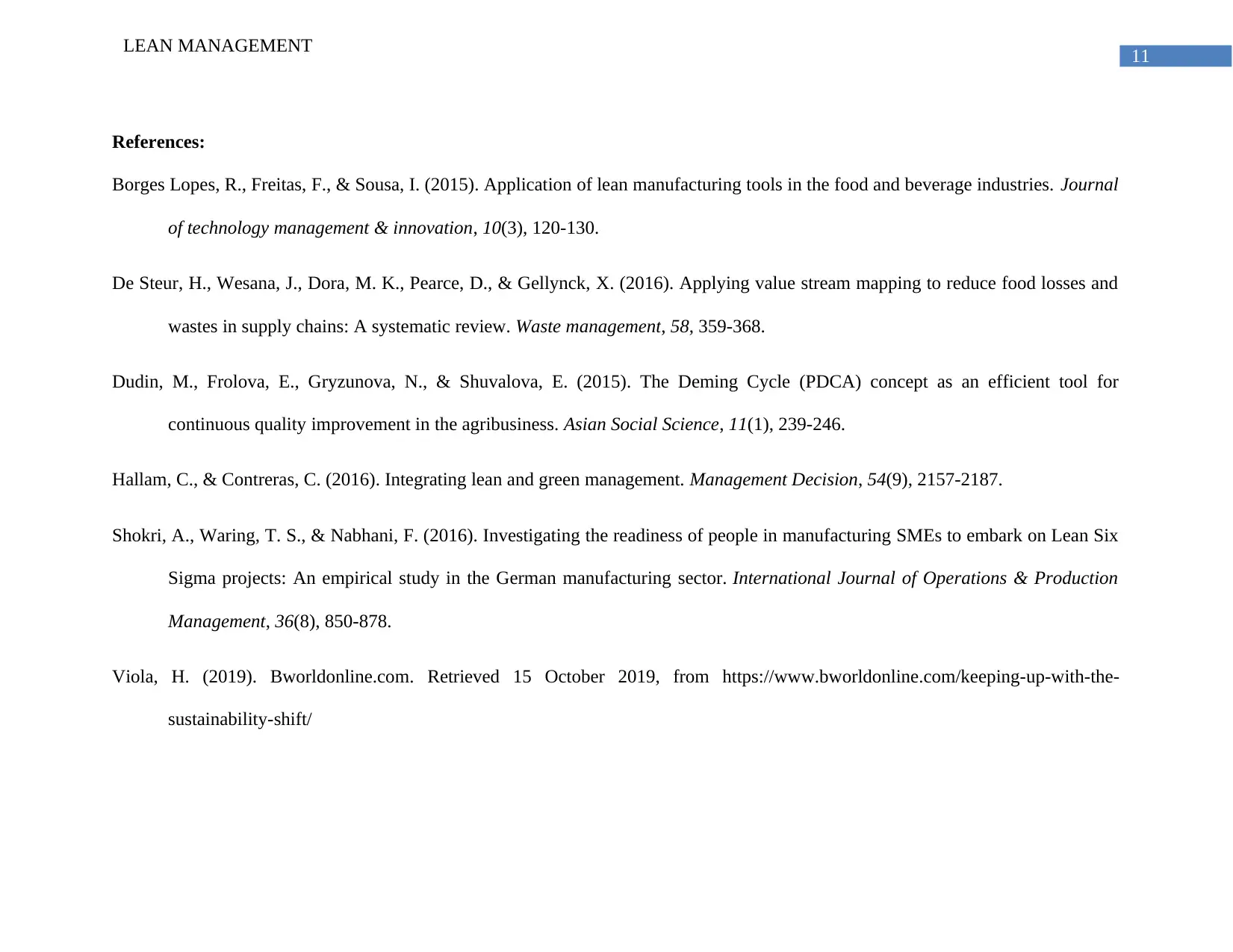
11
LEAN MANAGEMENT
References:
Borges Lopes, R., Freitas, F., & Sousa, I. (2015). Application of lean manufacturing tools in the food and beverage industries. Journal
of technology management & innovation, 10(3), 120-130.
De Steur, H., Wesana, J., Dora, M. K., Pearce, D., & Gellynck, X. (2016). Applying value stream mapping to reduce food losses and
wastes in supply chains: A systematic review. Waste management, 58, 359-368.
Dudin, M., Frolova, E., Gryzunova, N., & Shuvalova, E. (2015). The Deming Cycle (PDCA) concept as an efficient tool for
continuous quality improvement in the agribusiness. Asian Social Science, 11(1), 239-246.
Hallam, C., & Contreras, C. (2016). Integrating lean and green management. Management Decision, 54(9), 2157-2187.
Shokri, A., Waring, T. S., & Nabhani, F. (2016). Investigating the readiness of people in manufacturing SMEs to embark on Lean Six
Sigma projects: An empirical study in the German manufacturing sector. International Journal of Operations & Production
Management, 36(8), 850-878.
Viola, H. (2019). Bworldonline.com. Retrieved 15 October 2019, from https://www.bworldonline.com/keeping-up-with-the-
sustainability-shift/
LEAN MANAGEMENT
References:
Borges Lopes, R., Freitas, F., & Sousa, I. (2015). Application of lean manufacturing tools in the food and beverage industries. Journal
of technology management & innovation, 10(3), 120-130.
De Steur, H., Wesana, J., Dora, M. K., Pearce, D., & Gellynck, X. (2016). Applying value stream mapping to reduce food losses and
wastes in supply chains: A systematic review. Waste management, 58, 359-368.
Dudin, M., Frolova, E., Gryzunova, N., & Shuvalova, E. (2015). The Deming Cycle (PDCA) concept as an efficient tool for
continuous quality improvement in the agribusiness. Asian Social Science, 11(1), 239-246.
Hallam, C., & Contreras, C. (2016). Integrating lean and green management. Management Decision, 54(9), 2157-2187.
Shokri, A., Waring, T. S., & Nabhani, F. (2016). Investigating the readiness of people in manufacturing SMEs to embark on Lean Six
Sigma projects: An empirical study in the German manufacturing sector. International Journal of Operations & Production
Management, 36(8), 850-878.
Viola, H. (2019). Bworldonline.com. Retrieved 15 October 2019, from https://www.bworldonline.com/keeping-up-with-the-
sustainability-shift/
⊘ This is a preview!⊘
Do you want full access?
Subscribe today to unlock all pages.

Trusted by 1+ million students worldwide
1 out of 14
Related Documents
Your All-in-One AI-Powered Toolkit for Academic Success.
+13062052269
info@desklib.com
Available 24*7 on WhatsApp / Email
![[object Object]](/_next/static/media/star-bottom.7253800d.svg)
Unlock your academic potential
Copyright © 2020–2026 A2Z Services. All Rights Reserved. Developed and managed by ZUCOL.





